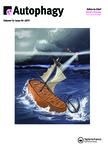版权所有:内蒙古大学图书馆 技术提供:维普资讯• 智图
内蒙古自治区呼和浩特市赛罕区大学西街235号 邮编: 010021

作者机构:Med Coll Georgia Dept Cellular Biol & Anat Augusta GA 30912 USA Med Coll Georgia Dept Biochem & Mol Biol Augusta GA 30912 USA Med Coll Georgia MCG Inst Canc Augusta GA 30912 USA
出 版 物:《AUTOPHAGY》 (自体吞噬)
年 卷 期:2010年第6卷第1期
页 面:19-35页
核心收录:
学科分类:0710[理学-生物学] 07[理学] 09[农学]
基 金:MCG Foundation NIH [R01 CA121438]
主 题:tamoxifen bortezomib ER stress autophagy protein turnover BNIP3 cathepsins
摘 要:In recent studies, we and others showed that autophagy is critical to estrogen receptor positive (ER+) breast cancer cell survival and the development of antiestrogen resistance. Consequently, new approaches are warranted for targeting autophagy in breast cancer cells undergoing antiestrogen therapy. Because crosstalk has been demonstrated between the autophagy- and proteasome-mediated pathways of protein degradation, this study investigated how the proteasome inhibitor bortezomib affects autophagy and cell survival in antiestrogen-treated ER+ breast cancer cells. Bortezomib, at clinically achievable doses, induced a robust death response in ER+, antiestrogen-sensitive and antiestrogen-resistant breast cancer cells undergoing hormonal therapy. Cleavage of PARP and lamin A was detectable as a read-out of cell death, following bortezomib-induced mitochondrial dysfunction. Prior to induction of cell death, bortezomib-treated cells showed high levels of light chain 3 (LC3) and p62, two protein markers for autophagy. The accumulation of these proteins was due to bortezomib-mediated blockade of long-lived protein turnover during macroautophagy. This novel action of bortezomib was linked to its blockade of cathepsin-L activity, which is required for autolysosomal-mediated protein turnover in ER+ breast cancer cells. Further, bortezomib-treated breast cancer cells showed induction of the unfolded protein response, with upregulation of CHOP and GRP78. Bortezomib also induced high levels of the pro-apoptotic protein BNIP3. Knockdown of CH OP and/or BNIP3 expression via RNAi targeting significantly attenuated the death-promoting effects of bortezomib. Thus, bortezomib inhibits prosurvival autophagy, in addition to its known function in blocking the proteasome, and is cytotoxic to hormonally treated ER+ breast cancer cells. These findings indicate that combining a proteasome inhibitor like bortezomib with antiestrogen therapy may have therapeutic advantage in the management of